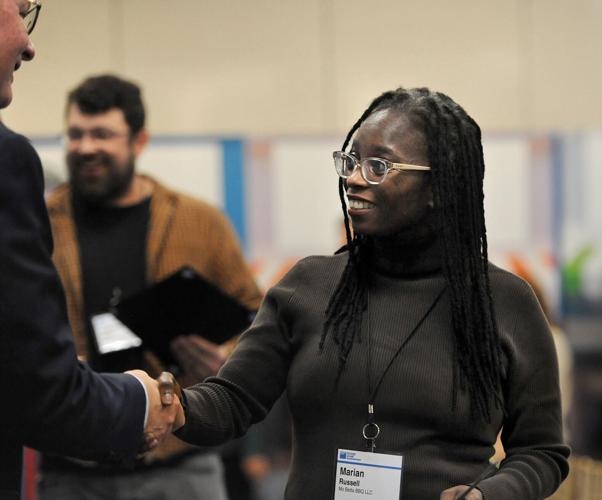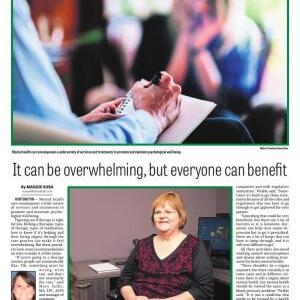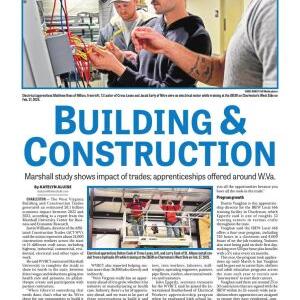Editor's note: This article was updated at 11 a.m. Saturday to correct the total number of businesses that have graduated from the nationwide program since its inception.
CHARLESTON ����ֱ��� As part of a $100 million investment in rural communities, the first cohort of West Virginia small business owners have graduated from the education program.
It����ֱ���s an initiative that����ֱ���s been around for nearly 15 years to help small businesses grow and create jobs by providing them with greater access to education, capital and support services. More than 16,500 business owners have graduated from the program across all 50 states; Washington, D.C.; and Puerto Rico.
Marian Russell, co-owner of Mo Betta BBQ, was the only Huntington-based business in the cohort. Mo Betta opened in April 2023 at The Market on 3rd Avenue but previously had a location in Winfield, West Virginia.
She said the program was a great opportunity to enhance her business knowledge and make sure they are running efficiently as possible.
����ֱ���It has given us a lot of networking insight and business processes, tweaking those things and making sure that we are running it the way we should and that way we can be more creative,����ֱ��� Russell said.
She said her top takeaways from the program were that marketing is key to her business����ֱ��� strategy and making a plan to expand the business with a food truck.
To be eligible for the program, a participant must be a business owner or co-owner; in operation for at least two years; have revenue of $75,000 or more in one of the past two fiscal years; and have at least two employees including the entrepreneur.
Another graduate of the program, Toni Brancazio, a co-founder and partner of Mountain State CNC based in Ravenswood, West Virginia, said her business repairs, services and maintains CNC, or computer numerical control machinery, and manual manufacturing machinery.
����ֱ���We����ֱ���ve been at that since November of 2020. And we service companies primarily in West Virginia and Ohio, but also in parts of Kentucky and Virginia,����ֱ��� Brancazio said. ����ֱ���We����ֱ���re proud to help manufacturers keep their products running, the products that are so vital to their bottom line.����ֱ���
Her top advice for business owners looking to apply is that they make as much time as they can for the program.
����ֱ���It����ֱ���s an investment of time and energy. And the upside cannot be overestimated. The more you put in, the more you get out,����ֱ��� she said.
There is also an opportunity to network online through the ����ֱ���Connect Program����ֱ��� with the nearly 16,000 people who����ֱ���ve graduated from the course. She called it a ����ֱ���phenomenal source that continues to keep giving.����ֱ���
����ֱ���The great thing about the program is everything that we learned is geared towards and looked at, with an eye to ����ֱ���how do we do it in our own business?����ֱ��� How do we apply this to our own business? Financials are certainly something. How do we best apply financials? What ratio is the best fit? What does that tell us about our business? How well we����ֱ���re operating, what we might want to change. Evaluating our growth opportunity is absolutely, I think, number one,����ֱ��� Brancazio said.
����ֱ���That����ֱ���s the whole idea of this course. The goal is that we come out at the other end with a growth opportunity that we����ֱ���ve evaluated quite carefully. We know how we want to implement it. We discussed it. We����ֱ���ve run numbers on it. That����ֱ���s absolutely key.����ֱ���
Through the program, business owners gain skills across topics such as financial statements, negotiation, marketing and employee management, and gain the tools to develop a customized business plan for growth.
Asahi Pompey, global head of corporate engagement at Goldman Sachs, compared the program to a ����ֱ���mini MBA.����ֱ��� It����ֱ���s free, but there is a rigorous application and interview process to get in.
����ֱ���We really believe, at Goldman Sachs, about doing our homework. So we spent dozens of hours in meetings with rural economic developers with chambers of commerce, really getting to know the business sector community of West Virginia. And we use those channels to recruit business owners who we think would really benefit from the program,����ֱ��� Pompey said.
Each business owner had to apply for the program, then be interviewed to determine whether they would be able to fully take advantage of the curriculum, Pompey said.
Small businesses account for of West Virginia businesses and employ nearly half the state����ֱ���s workforce.
BridgeValley Community and Technical College in South Charleston ran the program����ֱ���s 12-week curriculum with modules on themes including marketing, accounting and operations. The graduation ceremony was held there Friday.
Participants learned about working on their business instead of just working in their business day-to-day.
����ֱ���This was an opportunity to really step back, almost look at their business from the outside. Where are the scale opportunities? Where are the efficiency opportunities? How can I grow the business? What����ֱ���s my strategy for that? And this was a chance for them to get laser focused on it,����ֱ��� Pompey said.
According to the program����ֱ���s , 66% of alumni increased revenue and 44% created jobs in their communities six months after graduating from the program.
Allison Jarrett, a dentist in Charleston, is another graduate of the course. She applied because she didn����ֱ���t feel equipped with the knowledge or skills needed to run a business.
����ֱ���I����ֱ���m able to apply and implement all the knowledge that I����ֱ���ve learned right away and take this to my business because we����ֱ���re working on our own businesses while we����ֱ���re in the class, which has been really interesting because you don����ֱ���t normally have time to do that as a business owner. So that����ֱ���s been really great,����ֱ��� Jarrett said.
She liked how the curriculum focused on a new topic with new experts each week.
����ֱ���The community of small business owners and within the state of West Virginia that I����ֱ���ve met and now network with ����ֱ��� just having that networking community now is amazing,����ֱ��� Jarrett said.
An additional announcement was made at the end of Friday����ֱ���s ceremony: Through an established partnership with the community development financial institution (CDFI) intermediary Appalachian Community Capital, Goldman Sachs is committing $5 million in lending capital to CDFIs in the 13-state Appalachian region that drive small business growth and economic opportunities in underserved communities, including $1 million directly to Partner Community Capital, a West Virginia-based CDFI serving small businesses in the state.
����ֱ���Goldman Sachs and Appalachian Community Capital have a shared focus on increasing small business lending to underserved communities by providing new sources of capital,����ֱ��� said Donna Gambrell, president and CEO of Appalachian Community Capital. ����ֱ���We are confident that with this partnership, we can help empower entrepreneurs across the region to continue to grow their businesses.����ֱ���






















